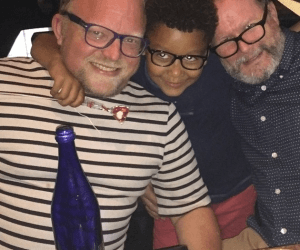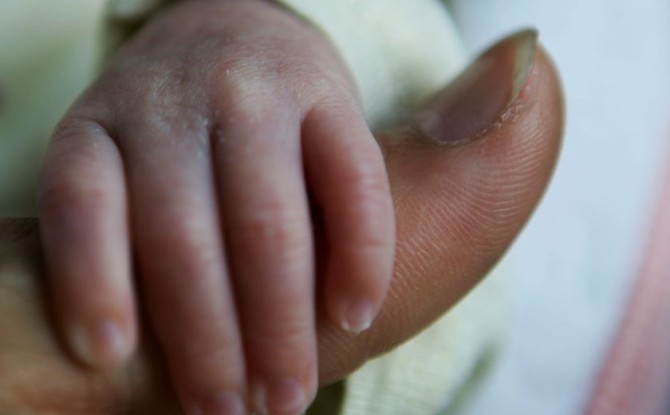Just Being Parents
Same-sex couples find options in adoption and foster parenting
http://www.justout.com/news.aspx?id=4
by Heather Cassell
Since the ’90s, visibility has been given to the gay community’s slice of the American dream—the lavender house with two kids strapped into the eco-friendly SUV, headed on the queer family vacation package.
“I’ve been extremely impressed by the caliber of parenting I see from our gay and lesbian clients,” said Shari Levine, executive director of Open Adoption & Family Services in Portland.
Approximately 40 percent of the organization’s prospective parents are gay or lesbian, said Levine, and Open Adoption & Family Services allows an open relationship between adopted children and both their birth and adoptive parents. Levine added that both hetero and same-sex couples can expect a 10- to 11-month adoption period through her agency.
Many same-sex parents don’t view themselves as different from other parents, but others speculate that gay parents may raise their children with a greater awareness of diversity.
“Being a gay parent hasn’t been defined as being gay, but as a parent,” said Tyler Silver, who has two children with his partner of five years, Joel Schudde.
Carrie Adamson-John added, “I think that we would parent the same if we were straight…sexuality is a separate issue from parenting.” She is raising 2-year-old Dakotah with her partner, Shanon. “If you have a child and they are small, you can be encouraging, nurturing and respectful of their spirit no matter what. We parent him with respect and love.”
This is a reoccurring theme among same-sex parents, and none seemed concerned about their children having problems at school because they have same-sex parents.
Trish and Jan Calvin’s voices resonate with pride when they talk about their oldest daughter, Sarah, not being afraid to stand up to other kids when she gets grief for having gay parents. The parents said that Sarah sometimes gets tired of explaining her unique family to other kids but that she typically doesn’t have any problem talking about her two moms and brings books such as And Tango Makes Three and Heather Has Two Mommies to school for the teacher to read to the class.
According to the Williams Institute—a sexual minority think tank at University of California, Los Angeles—more than half of gay men and 41 percent of lesbians want to have a child. The research organization published those statistics in Adoption & Foster Care by Lesbians & Gay Men in March 2007.
According to the report, an estimated 65,500 adopted children live with a gay or lesbian parents and 2 million gay and lesbian people are interested in adopting. The institute estimated that of 23,901 adoptions in Oregon, 1,232 are by gay and lesbian parents. It also estimated that 14,100 foster children are living with gay or lesbian parents nationwide, including about 250 in Oregon.
Fertility experts are noticing a rise in sexual minorities looking at reproductive technologies as an option in their family planning.
Oregon Reproductive Medicine—formerly the Portland Center for Reproductive Medicine—has been helping gay couples and individuals with their reproductive needs for many years, “not just lately because it’s become in vogue,” said Jonathan Kipp, a spokesman for the center. Kipp, a gay man, said he has noticed an increase in queer clients at the center from as far away as France.
“There is a wide range of options for the gay community now to be able to create their families,” said Stuart Miller, co-founder and chief executive officer of Growing Generations. He estimated the agency has seen a 20 percent increase in mostly gay male clients with a few lesbian clients annually.
The trend hasn’t escaped the American Fertility Association, a New York-based reproductive technologies organization, either. For the third consecutive year, the organization hosted a queer-specific tract at its Family Matters Conference, where Miller and John J. Weltman, president of Circle Surrogacy, were presenters in San Francisco in February. This was the first year the conference was held on the West Coast.
Silver and Schudde, 38-year-old gay men, chose to have biological children. Their first two children, William, 4, and Bryn, 2, were born using Silver’s DNA and a surrogate through Growing Generations.
Silver, who has a graduate degree in family and children counseling and is retired, said he chose to use reproductive technologies because it “felt comforting to have my genetic history involved.”
Schudde, a former public administrator and now a stay-at-home dad, is attempting to have a child using his DNA and a surrogate.
While reproductive technologies are an emerging option for gay family planning, it’s expensive, and infertility issues can enter the picture.
“I wanted to be pregnant for as long as I could remember,” said Shanon Adamson-John, who was diagnosed with unidentified infertility. “My life without a child wasn’t an option.”
She and Carrie looked into adoption through Open Adoption & Family Services, and within three weeks, they adopted a son. The Adamson-Johns were unusually lucky.
Trish Calvin had difficulty conceiving when she attempted to have a second child. She and Jan, a couple of 19 years, not only added Alison, 4, to their family, but they also acquired two gay godfathers and a godson in the process.
Ed Lazzara, 48, and Kurt Garcia-Ottens, 45, were already in Open Adoption & Family Services’ adoption pool when they met the Calvins, who were exploring adoption. At the men’s suggestion, the Calvins joined the pool and adopted Alison before Lazzara and Garcia-Ottens adopted their son, Leo, 3.
“It was a blessing,” said Trish, recalling that Alison became Lazzara’s and Garcia-Ottens’ “practice child, because they really had no clue how to change a diaper.”
Lazzara and Garcia-Ottens, a couple of 17 years, explored family planning options and decided adoption felt right for them.
Christian Hetchinson, 40, and his partner of 19 years, Timothy Kirchner, 42, weren’t quite ready to adopt, so they opted to become foster parents as a “beginning step” into parenthood.
Hetchinson said they weren’t sure if they would even be allowed to be foster parents, but with the help of a private child service organization, they have been foster parents to three boys between 12 and 15 years old for the past eight months.
“We thought it would be fun being foster parents, and it’s been much more fun than we ever expected it to be,” said Hetchinson, who is now a full-time foster parent while Kirchner manages a retail store.
Other than spoiling the boys, Hetchinson, who plans on having a “steady flow of kids coming through our house,” said the best part of being a foster parent is something significant: “We are able to give back to these kids something that maybe they didn’t have in their homes or their personal history.”
For more information visit www.oregonreproductivemedicine.com, www.openadopt.org, www.boysandgirlsaid.org and www.fyi3.com/fyi3/states/oregon.cfm .
 surrogacy. Ultimately, they felt that the process was overly expensive and that their own DNA was not that precious when there were kids in foster care that needed parents.
surrogacy. Ultimately, they felt that the process was overly expensive and that their own DNA was not that precious when there were kids in foster care that needed parents.

